Adscharien |
|
|
|
| Übersicht – Contents: | |
Diese Seite ist Teil des Projektes
Adscharien |
|
|
|
| Übersicht – Contents: | |
Flagge – Flag: |
|
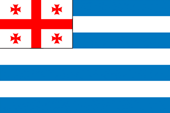 |
seit/since 2004, |
historische Flaggen – historical Flags: |
|
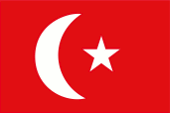 |
bis/to 1878, Das Land gehört zum Osmanischen Reich – the country belongs to the Ottoman Empire, Quelle/Source, nach/by: World Statesmen |
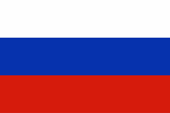 |
1878–1918, Das Land gehört zu Russland – the country belongs to Russia, Quelle/Source, nach/by: World Statesmen |
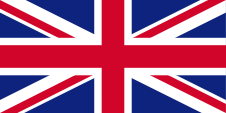 |
1918–1920, Das Land ist von Großritannien besetzt – the country is occupuied by the U.K., Quelle/Source, nach/by: World Statesmen |
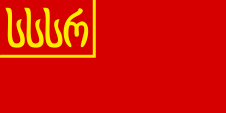 |
1921–1937, Sozialistische Sowjetrepublik Adscharien – Socialist Soviet Republic Adzharistan, Quelle/Source, nach/by: World Statesmen |
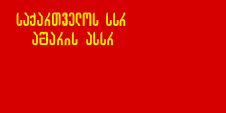 |
1937–1951, Adscharische Autonome Sozialistische Sowjetrepublik – Adzhar Autonomous Soviet Socialist Republic, Quelle/Source, nach/by: World Statesmen |
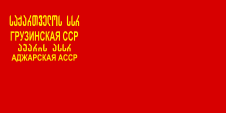 |
1937–1951, Adscharische Autonome Sozialistische Sowjetrepublik – Adzhar Autonomous Soviet Socialist Republic, Quelle/Source, nach/by: World Statesmen |
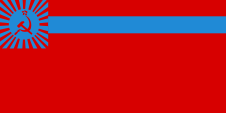 |
1951–1981, Adscharische Autonome Sozialistische Sowjetrepublik – Adzhar Autonomous Soviet Socialist Republic, Quelle/Source, nach/by: World Statesmen |
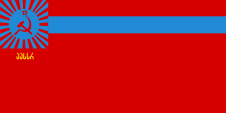 |
1981–1991, Adscharische Autonome Sozialistische Sowjetrepublik – Adzhar Autonomous Soviet Socialist Republic, Quelle/Source, nach/by: Wikipedia (D), World Statesmen |
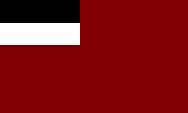 |
1991–2000, Autonome Republik Adscharien – Autonomous Republic of Adjara, Quelle/Source, nach/by: World Statesmen |
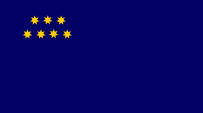 |
2000–2004, Autonome Republik Adscharien – Autonomous Republic of Adjara, Quelle/Source, nach/by: Wikipedia (D), World Statesmen |
|
siehe auch – look also: Flaggengeschichte der Sowjetrepubliken der UdSSR – flag history of the soviet republics of the USSR |
|
|
|
|
Bedeutung/Ursprung der Flagge – Meaning/Origin of the Flag: |
|
| Die heutige Flagge Adschariens wurde am 20. Juli 2004 angenommen. Sie zeigt sieben horizontale blaue und weiße Streifen und im Obereck die Flagge Georgiens. Über die Bedeutung der Farben ist nichts bekannt. Die Adscharen sind etnische Georgier, bekennen sich aber zum Islam. Für sie wurde die Republik einst geschaffen, heute sind sie jedoch eine Minderheit. Immerhin war das Gebiet von 1520 bis 1878 Teil des Osmanischen Reiches und kam dann bis 1918 an Russland. Nachdem die Türkei nach dem Zusammenbruch des Zarenreichs erneut die Kontrolle übernehmen wollte war das Land von 1918 bis 1920 von einer britischen Schutztruppe besetzt. Nach dem Abzug der Briten kam das Land unter die Kontrolle der Russischen Lenin-Putschisten, die, nationales und religiöses Engagement vortäuschend, 1921 die Sozialistische Sowjetrepublik Adscharien als Bestandteil Sowjet-Georgiens gründeten. Damit begann die lange Ära der roten Fahnen des Kommunismus. Das erste Exemplar, das bis 1937 verwendet wurde, war die gleiche Flagge wie die Sowjet-Georgiens und zeigte in der Oberecke die Initialen von Sowjet-Georgien. Von 1937 bis 1951 zeigte die Flagge in goldenen georgischen Buchstaben den Namen der Georgischen Sozialistische Sowjetrepublik und darunter der Adscharischen Autonomen Sozialistischen Sowjetrepublik, manchmal noch zusätzlich durch die Landesnamen in russischer Sprache ergänzt. Am 11.04.1951 war für Georgien eine neue Flagge eingeführt worden. Sie war zwar einfarbig rot, jedoch für sowjetische Verhältnisse recht ungewöhnlich gestaltet, denn in der Oberecke zeigte sie eine blaue Sonne, in deren Mitte Hammer, Sichel und Stern in Rot platziert wurden. Weiterhin verlief innerhalb der oberen Hälfte der Flagge ein waagerechter blauer Streifen, der den wolkenlosen und blauen Himmel Georgiens symbolisieren sollte. Diese Flagge wurde auch für Adscharien (die Adscharische Autonome Sozialistische Sowjetrepublik) übernommen und bis 1981 beibehalten. Zwischen 1981 und 1991 erschienen dann die Initialen der Republik in goldenen georgischen Buchstaben unterhalb der blauen Sonne in der Oberecke. Nach dem Ende der Sowjetmacht wurde in Georgien wieder die bürgerliche Flagge eingeführt, so wie schon von 1918 bis 1921 in Verwendung war. Adscharien blieb eine Autonome Republik innerhalb Georgiens, hatte jedoch dessen Flagge zu verwenden, bis 2000 eine einfarbige blaue Nationalflagge eingeführt wurde, die sieben goldene Sterne im Obereck zeigte. Sie ähnelte der Flagge der Partei "Union für Demokratische Wiedergeburt", die jedoch 2004 die Macht abgeben musste. Die Autonomierechte Adschariens wurden von Georgien eingeschränkt und in diesem Zuge die heutige Flagge eingegführt. |
The current flag of
Ajaria was adopted on 20th of July in 2004. It shows seven horizontal blue and white stripes
and the flag of Georgia in the upper corner. Nothing is known about the
meaning of the colors. The Adjarians are ethnic Georgians, but profess Islam. The republic was once created for them, but today they are a minority. After all, the area was part of the Ottoman Empire from 1520 to 1878 and then came to Russia until 1918. After Turkey wanted to take over again after the collapse of the Tsarist empire, the country was occupied by a British protection forces from 1918 to 1920. After the withdrawal of the British, the country came under the control of the Russian Lenin putschists, who, pretending to be tolerant on national and religious ideas, founded the Soviet Socialist Republic of Ajaria in 1921 as part of Soviet Georgia. This marked the beginning of the long era of the red flags of communism. The first example, in use until 1937, was the same flag as it was used in Soviet Georgia, with the initials of Soviet Georgia in the upper corner. From 1937 to 1951, the flag showed in the upper canton in golden Georgian letters the name of the Georgian Soviet Socialist Republic and, below it, of the Ajarian Autonomous Soviet Socialist Republic, sometimes supplemented by the country names in Russian. On April 11th in 1951, a new flag was introduced for Georgia. Although it was monochrome red, it was designed quite unusually for Soviet standards, because in the upper corner it showed a blue sun, in the middle of it the hammer, sickle and star were placed in red. Furthermore, a horizontal blue stripe ran within the upper half of the flag, which should symbolize the cloudless and blue sky of Georgia. This flag was also adopted for Adjara (the Adjar Autonomous Soviet Socialist Republic) and was maintained until 1981. Between 1981 and 1991 the initials of the republic appeared in golden Georgian letters below the blue sun in the upper corner. After the end of Soviet power, the bourgeois flag was reintroduced in Georgia, as it was in use from 1918 to 1921. Ajaria remained an Autonomous Republic within Georgia, but had to use its flag until 2000, when a single-colored blue national flag was introduced, showing seven golden stars in the upper corner. It resembled the flag of the Union for Democratic Rebirth Party, which had to give up power in 2004. The autonomy rights of Ajaria were restricted by Georgia and the current flag was introduced during that process. |
| Quelle/Source: Wikipedia (D), Wikipedia (FR), World Statesmen, Volker Preuß | |
| Landkarte – Map: |
Lage
Georgiens – Position of Georgia: |
Lage
Adschariens im Süden Georgiens |
| Zahlen und Fakten – Numbers and Facts: | |
| ` | |
|
|
|
|
|
|
|
|
|
|
|
|
|
|
|
|
|
|
| 1547–1564 · zum Osmanischen Reich 1582–1609 · zum Osmanischen Reich 1614 · Annexion durch das Osmanische Reich 1878 · Vertrag von San Stefano, das Osmanische Reich muss die Region an Russland abtreten März 1918 · Russland tritt die Region an das Osmanische Reich ab, die Region wird durch das Osmanische Reich besetzt Dezember 1918 · eine britische Schutztruppe besetzt das Land 20.07.1920 · Großbritannien übergibt die Region an die Republik Georgien 1921 · die Russischen Kommunistischen Lenin-Putschisten besetzen das Land 16.07.1921 · Gründung der Sozialistischen Sowjetrepublik Adscharien 15.12.1936 · Umgründung zur Adscharischen Autonomen Sozialistischen Sowjetrepublik innerhalb Sowjet-Georgiens Dezember 1990 · Proklamation der Autonomen Republik Adscharien April 1991 · Machtergreifung durch Aslan Abaschidse 06.05.2004 · Rücktritt von Aslan Abaschidse 01.07.2004 · die Autonomierechte Adschariens werden von Georgien eingeschränkt |
| 1547–1564 · to the Ottoman Empire 1582–1609 · to the Ottoman Empire 1614 · Annexation by the Ottoman Empire 1878 · Treaty of San Stefano, the Ottoman Empire has to cede the region to Russia March 1918 · Russia cedes the region to the Ottoman Empire, the region is occupied by the Ottoman Empire December 1918 · a British protection force occupies the country 20th of July in 1920 · the U.K. hands over the region to the Republic of Georgia 1921 · the Russian Communist Lenin putschists occupy the country 16th of July in 1921 · foundation of the Soviet Socialist Republic of Adjara (Adzharistan) 15th of December in 1936 · teorganization to the Adjarian Autonomous Soviet Socialist Republic within Soviet Georgia December 1990 · proclamation of the Autonomous Republic of Adjara April 1991 · Aslan Abashidze seizes power 6th of May in 2004 · resignation of Aslan Abashidze 1st of July in 2004 · the autonomy rights of Ajaria are restricted by Georgia |
| Quelle/Source: World Statesmen, Wikipedia (D), Volker Preuß |
Ursprung des Landesnamens – Origin of the Country's Name: |
|
| Das Land hat seinen Namen von den hier lebenden Adscharen her. Die Adscharen sind etnische Georgier, bekennen sich aber zum Islam. Für sie wurde die Republik einst geschaffen, heute sind sie eine Minderheit. | The country has its name from the Adjarians who live here. The Adjarians are ethnic Georgians, but profess Islam. The republic was once created for them, but today they are a minority. |
| Quelle/Source: Volker Preuß | |